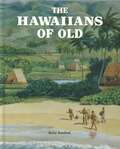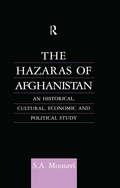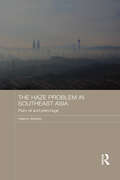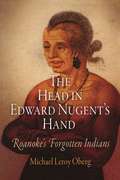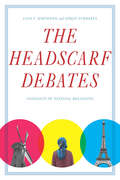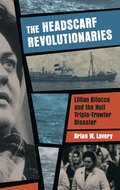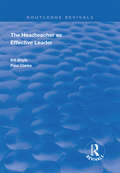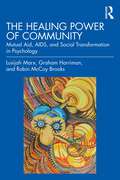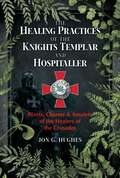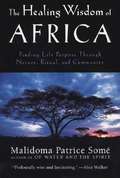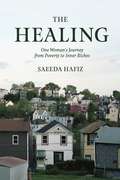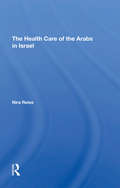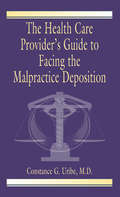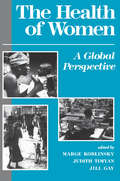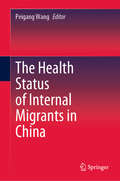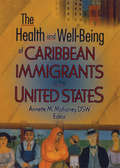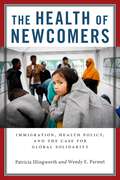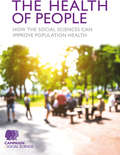- Table View
- List View
The Hawaiians of Old
by Betty Dunford Lilinoe Andrews Mika'Ala Ayau Liana I. Honda Julie Stewart WilliamsCovers the formation of the Hawaiian islands; the arrival of plants, animals, and the first people; and the way of life of the ancient Hawaiians.
The Hazaras of Afghanistan: An Historical, Cultural, Economic And Political Study
by S. A. MousaviStudy of the second largest but least well-known ethnic group in Afghanistan that also confronts the taboo subject of Afghan national identity. Largely Farsi-speaking Shi'ias, the Hazaras traditionally inhabited central Afghanistan, but because of the war are now widely scattered.
The Hazards of Being Male: Surviving the Myth of Masculine Privilege
by Herb GoldbergTODAY ONE GREAT DIFFERENCE BETWEEN MEN AND WOMEN IS THAT WOMEN AT LEAST KNOW THEY ARE OPPRESSED. Men have heard for as long as they can remember that it is a "man's world" and that they are the privileged sex. What they often discover too late is that their "privileges" include the right to live lives of mounting frustration, weariness and loneliness, and to die earlier than their female counterparts. For American men are raised by parents, conditioned by society, and often encouraged by women to play a role of lover-husband-parent-breadwinner-strong-and-silent-man whose impossible demands psychically cripple and eventually physically kill them. If you are a man, you will instantly recognize yourself and the dangers that threaten you when you read this book. If you are a woman who loves a man, you will want both him and yourself to read it.
The Haze Problem in Southeast Asia: Palm Oil and Patronage (Routledge Malaysian Studies Series)
by Helena VarkkeyDespite the efforts of Southeast Asian governments and of ASEAN, transboundary haze continues to be a major environmental problem in Southeast Asia. This book demonstrates that the issue is complex, and explains why efforts to solve the problem in purely political terms are ineffective, and likely to continue to be ineffective. The book shows how state-led, state-incentivised agribusiness development lies at the heart of the problem, leading to a large rise in palm oil production, with extensive clearing of forests, leading to deliberate or accidental fires and the resulting haze. Moreover, although the forest clearing is occurring in Indonesia, many of the companies involved are Malaysian and Singaporean; and, further, many of these companies have close relationships with the politicians and officials responsible for addressing the problem and who thereby have a conflict of interest. The author concludes by discussing the huge difficulties involved in overturning this system of 'patronage politics'.
The Haçienda: How Not to Run a Club
by Peter HookThe acclaimed and wildly outlandish inside account of England’s most notorious music club, The Hacienda, from Peter Hook, the New York Times bestselling author of Unknown Pleasures and co-founder of Joy Division and New Order—a story of music, gangsters, drugs, and violence, available for the first time in the United States.During the 1980s, The Hacienda would become one of the most famous venues in the history of clubbing—a celebrated cultural watershed alongside Studio 54, CBGBS, and The Whiskey—until its tragic demise.Founded by New Order and Factory Records, The Hacienda hosted gigs by such legendary acts as the Stone Roses, the Smiths, Bauhaus, Grandmaster Flash, Run DMC, Kurtis Blow, and Happy Mondays; gave birth to the “Madchester” scene; became the cathedral for acid house; and laid the tracks for rave culture and today’s electronic dance music. But over the course of its fifteen-year run, “Madchester” descended into “Gunchester” as gangs, drugs, greed, and a hostile police force decimated the dream.Told in Hook’s uproarious and uncompromising voice, The Hacienda is a funny, horrifying, and outlandish story of success, idealism, naïveté, and greed—of an incredible time and place that would change the face and sound of modern music.The Hacienda includes 32 photographs in 16-page four-color insert.
The Head in Edward Nugent's Hand
by Michael Leroy ObergRoanoke is part of the lore of early America, the colony that disappeared. Many Americans know of Sir Walter Ralegh's ill-fated expedition, but few know about the Algonquian peoples who were the island's inhabitants. The Head in Edward Nugent's Hand examines Ralegh's plan to create an English empire in the New World but also the attempts of native peoples to make sense of the newcomers who threatened to transform their world in frightening ways.Beginning his narrative well before Ralegh's arrival, Michael Leroy Oberg looks closely at the Indians who first encountered the colonists. The English intruded into a well-established Native American world at Roanoke, led by Wingina, the weroance, or leader, of the Algonquian peoples on the island. Oberg also pays close attention to how the weroance and his people understood the arrival of the English: we watch as Wingina's brother first boards Ralegh's ship, and we listen in as Wingina receives the report of its arrival. Driving the narrative is the leader's ultimate fate: Wingina is decapitated by one of Ralegh's men in the summer of 1586.When the story of Roanoke is recast in an effort to understand how and why an Algonquian weroance was murdered, and with what consequences, we arrive at a more nuanced and sophisticated understanding of what happened during this, the dawn of English settlement in America.
The Headless State: Aristocratic Orders, Kinship Society, and Misrepresentations of Nomadic Inner Asia
by David SneathIn this groundbreaking work, social anthropologist David Sneath aggressively dispels the myths surrounding the history of steppe societies and proposes a new understanding of the nature and formation of the state. Since the colonial era, representations of Inner Asia have been dominated by images of fierce nomads organized into clans and tribes-but as Sneath reveals, these representations have no sound basis in historical fact. Rather, they are the product of nineteenth-century evolutionist social theory, which saw kinship as the organizing principle in a nonstate society. Sneath argues that aristocratic power and statelike processes of administration were the true organizers of life on the steppe. Rethinking the traditional dichotomy between state and nonstate societies, Sneath conceives of a "headless state" in which a configuration of statelike power was formed by the horizontal relations among power holders and was reproduced with or without an overarching ruler or central "head." In other words, almost all of the operations of state power existed at the local level, virtually independent of central bureaucratic authority. Sneath's research gives rise to an alternative picture of steppe life in which aristocrats determined the size, scale, and degree of centralization of political power. His history of the region shows no clear distinction between a highly centralized, stratified "state" society and an egalitarian, kin-based "tribal" society. Drawing on his extensive anthropological fieldwork in the region, Sneath persuasively challenges the legitimacy of the tribal model, which continues to distort scholarship on the history of Inner Asia.
The Headless State: Aristocratic Orders, Kinship Society, and Misrepresentations of Nomadic Inner Asia
by David SneathIn this groundbreaking work, social anthropologist David Sneath aggressively dispels the myths surrounding the history of steppe societies and proposes a new understanding of the nature and formation of the state. Since the colonial era, representations of Inner Asia have been dominated by images of fierce nomads organized into clans and tribes—but as Sneath reveals, these representations have no sound basis in historical fact. Rather, they are the product of nineteenth-century evolutionist social theory, which saw kinship as the organizing principle in a nonstate society.Sneath argues that aristocratic power and statelike processes of administration were the true organizers of life on the steppe. Rethinking the traditional dichotomy between state and nonstate societies, Sneath conceives of a "headless state" in which a configuration of statelike power was formed by the horizontal relations among power holders and was reproduced with or without an overarching ruler or central "head." In other words, almost all of the operations of state power existed at the local level, virtually independent of central bureaucratic authority. Sneath's research gives rise to an alternative picture of steppe life in which aristocrats determined the size, scale, and degree of centralization of political power. His history of the region shows no clear distinction between a highly centralized, stratified "state" society and an egalitarian, kin-based "tribal" society. Drawing on his extensive anthropological fieldwork in the region, Sneath persuasively challenges the legitimacy of the tribal model, which continues to distort scholarship on the history of Inner Asia.
The Headscarf Debates: Conflicts of National Belonging
by Anna C. Korteweg Gökçe YurdakulThe headscarf is an increasingly contentious symbol in countries across the world. Those who don the headscarf in Germany are referred to as "integration-refusers." In Turkey, support by and for headscarf-wearing women allowed a religious party to gain political power in a strictly secular state. A niqab-wearing Muslim woman was denied French citizenship for not conforming to national values. And in the Netherlands, Muslim women responded to the hatred of popular ultra-right politicians with public appeals that mixed headscarves with in-your-face humor. In a surprising way, the headscarf—a garment that conceals—has also come to reveal the changing nature of what it means to belong to a particular nation. All countries promote national narratives that turn historical diversities into imagined commonalities, appealing to shared language, religion, history, or political practice. The Headscarf Debates explores how the headscarf has become a symbol used to reaffirm or transform these stories of belonging. Anna Korteweg and Gökçe Yurdakul focus on France, Germany, and the Netherlands—countries with significant Muslim-immigrant populations—and Turkey, a secular Muslim state with a persistent legacy of cultural ambivalence. The authors discuss recent cultural and political events and the debates they engender, enlivening the issues with interviews with social activists, and recreating the fervor which erupts near the core of each national identity when threats are perceived and changes are proposed. The Headscarf Debates pays unique attention to how Muslim women speak for themselves, how their actions and statements reverberate throughout national debates. Ultimately, The Headscarf Debates brilliantly illuminates how belonging and nationhood is imagined and reimagined in an increasingly global world.
The Headscarf Revolutionaries: Lillian Bilocca and the Hull Triple-Trawler Disaster
by Brian W. LaveryWinter 1968. Three Hull trawlers sink. One fishwife vows to change the law. A powerful story of death and survival. In the harsh Arctic seas of 1968, three trawlers from Hull's fleet sank in just three weeks. 58 men died. Lillian Bilocca put down her filleting knife, wrote a petition, and stormed into action. With her army of fishwives she took her battle to the docks and led a raid on Parliament. They changed the shipping laws, 'Big Lil' became an international celebrity. The lone survivor of the tragedies made headlines too. In a tight fishing community, it's dangerous to stand out.
The Headscarf as a Business Card: A Qualitative Case Study on Styles and Expressions of Berlin Muslim Women
by Juliane KanitzIn her book, Juliane Kanitz not only examines the frequently asked question of why Muslim women wear a headscarf, but also concentrates on how it is worn. She is concerned with the cultural, aesthetic and fashionable preferences of women and not primarily with the religious motives that are otherwise often the focus of attention. In addition to a contribution to research on the Muslim headscarf, the author presents theoretical and empirical supplements to Islamic fashion and Islam in Germany as a whole. She also discusses the debate on Europeanization, in which arguments against Muslims are put forward, and develops some perspectives on the topic of the headscarf in Germany that have not yet been taken into account, made possible by the new perspective of fashion.
The Headteacher as Effective Leader (Routledge Revivals)
by Paul Clarke Bill BoyleFirst published in 1998, this volume focuses on the range of crucial role that the headteacher must fulfil as the leader. It has become apparent that being a good manager and teacher is not enough, the headteacher has to be able to lead and communicate the vision of the school to the staff, pupils, parents and governors. The role includes auditing the needs of the school and leading the process of planning to meet its targets, balancing quality of provision and raising standards within the limits of the school environment. The roles of team builder, motivator and systems thinker are also essential. Finally the headteacher has the role of developing staff, and promoting self-development linked with school improvement.
The Healing Power of Community: Mutual Aid, AIDS, and Social Transformation in Psychology
by Robin McCoy Brooks Lusijah Marx Graham HarrimanThe Healing Power of Community offers a diverse cross section of interdisciplinary and depth-psychological perspectives in support of using mutual aid approaches in all levels of group and community practice as a remedy for individualism and social and political divisions, centering social justice.Written by three distinct voices who collaborated at the height of the AIDS crisis, the book begins with an autoethnographic study of Project Quest, an HIV/AIDS clinic established in 1989, before looking at how the lessons learnt from this clinic can be applied to our current global mental health climate. Filled with clinical and theoretical applications, chapters include content on what mutual aid communities are, rethinking professionalism and boundaries in a crisis, healing collective trauma, group psychotherapy, psychodrama, depth psychology, and how mental health professionals can support radical change of key structures in nonprofit clinics, public administration, private practice, and research. Arguing for their approach of radicalizing mental health and community-based practice today, the book examines how this can be achieved by moving beyond individual-level approaches, creating new frameworks to meet the mental health needs of our era in creative ways.This book is designed to engage clinical social workers and mental health care clinicians working in community-based mental health, as well as those involved in community psychology, collective trauma and grief, HIV/AIDS advocacy, policy making, and political advocacy.
The Healing Practices of the Knights Templar and Hospitaller: Plants, Charms, and Amulets of the Healers of the Crusades
by Jon G. Hughes• Presents a traditional &“cure-all&” or leechbook of the ailments the Crusaders would have encountered and the remedies their mediciners would have employed, including recipes for many cures and instructions • Includes a comprehensive herbal, listing all the medicinal plants and materials needed to make the remedies, potions, elixirs, and unctions of the cure-all • Details the author&’s travels in the steps of the Crusader physicians where he met with healers still employing the mediciners&’ practices During the Crusades, chivalric knightly orders, such as the Knights Templar and the Knights Hospitaller, brought along monastic mediciners to treat the sick and wounded. These mediciners not only employed the leading cures of medieval Europe but also learned new methods from the local folk-healers and Arabic healing traditions they encountered on their journeys. Presenting a traditional &“cure-all&” or leechbook of the Crusader physicians, the author shares a comprehensive encyclopedia of the ailments the Crusaders would have encountered and the remedies their mediciners would have employed. He details recipes for many cures and a range of magico-medical applications such as charms, spells, enchantments, and amulets used to address the new illnesses of strange and foreign lands. The author includes a detailed and comprehensive herbal, listing all the plants and materials needed to make and administer the remedies of the cure-all. He also details his travels in the steps of the Crusader physicians throughout Poland, the Czech Republic, Hungary, Malta, Morocco, and the island of Rhodes where he met with healers still following this healing path who shared their practices with him. Revealing how the healers of the Crusades helped elevate Western medical knowledge through the integration of wisdom from their Middle Eastern counterparts, Hughes shows how their legacy continues through the many effective remedies and healing modalities still in use today.
The Healing Wisdom of Africa: Finding Life Purpose Through Nature, Ritual, and Community
by Malidoma Patrice SoméThrough The Healing Wisdom of Africa, readers can come to understand that the life of indigenous and traditional people is a paradigm for an intimate relationship with the natural world that both surrounds us and is within us. The book is the most complete study of the role ritual plays in the lives of African people--and the role it can play for seekers in the West.
The Healing of America: A Global Quest for Better, Cheaper, and Fairer Health Care
by T. R. ReidA New York Times Bestseller, with an updated explanation of the 2010 Health Reform Bill Bringing to bear his talent for explaining complex issues in a clear, engaging way, New York Times bestselling author T. R. Reid visits industrialized democracies around the world--France, Britain, Germany, Japan, and beyond--to provide a revelatory tour of successful, affordable universal health care systems. Now updated with new statistics and a plain-English explanation of the 2010 health care reform bill, The Healing of America is required reading for all those hoping to understand the state of health care in our country, and around the world.T. R. Reid's newest book, A Fine Mess, will be published by Penguin Press in Spring 2017.
The Healing: One Woman's Journey from Poverty to Inner Riches
by Saeeda HafizIn this memoir of upward mobility through an unexpected route, a young black American woman signs up for lessons in yoga and clean eating as signifiers of her new middle class status, little realizing that her new lifestyle will bring her face to face with the inner demons fed by the domestic violence, addiction, and poverty she witnessed as a child.Graduating, getting established in your career, and dating another professional are things many young middle-class women expect to do and take for granted. But when your parents don't support you and you have siblings in prison, those milestones seem monumental. What does growing up poor do to your self-esteem? How do patterns of stress and family violence, poor diet and poor health continue to affect you even after you escape to a higher income bracket? And what can one woman do to turn around the cycle of racism, poverty, and intergenerational suffering? Hafiz gives a frank account of the anxiety and rewards of becoming "middle class" through a complete change of diet and adopting habits such as traveling and doing yoga. While her peers pursue one kind of African American dream by climbing the corporate ladder, Hafiz finds meaning in learning to cook macrobiotic food and practice meditation. By doing so, she recovers from chronic health conditions and heals from the family trauma she has inherited.
The Health Care Of The Arabs In Israel
by Nira ReissA study of the development of modern medical health services in Palestine until 1948 and in Israel, this book focuses on the interaction of state policy, class relations, voluntary organizations, and professional practice as they affect the level of participation of Arabs in the emergent health system.
The Health Care Provider's Guide to Facing the Malpractice Deposition
by Constance G. Uribe M.D.An anesthesiologist chips a patient's tooth during a difficult intubation. A surgeon leaves tiny abrasions on a patient's abdomen during a delicate surgical procedure. And an operating room nurse accidentally nips a patient's finger with a pair of scissors.Not all of these examples of medical mistakes will result in malpractice suits. But for the o
The Health Of Women: A Global Perspective
by Jill GayThis is a review of the many factors that affect women's health, ranging from low socioeconomic status and the impact of the debt crisis, to more direct medical determinants, such as poor nutrition, haemorrhage, eclampsia and infection. It includes the perspectives of policy-makers, practitioners, researchers and academics. The contributors assess the reduced quality of life for women and the often unacknowledged contributions of women and girls as the backbone of production in both developing and developed countries. They call for new initiatives to understand and improve women's health, taking into account biological elements such as the life-cycle of women as well as cultural constraints and socioeconomic realities.
The Health Status of Internal Migrants in China
by Peigang WangThis book describes the health status of internal migrants in China and explores a number of related factors, which include their physical health, mental health, fertility, social integration, the current state of basic public health services in China and so on. At present, there are 245 million migrants working in China, which means 1 out of every 6 people is a migrant. The large scale of the migrant population is accompanied by a range of problems concerning e.g. public health and medical services. This book draws on the latest findings and data to describe and analyze the health status of migrants in China from three perspectives – population distribution, time distribution and spatial distribution – and each chapter employs various advanced statistical methods, such as multilevel modeling and propensity score matching. Given the in-depth information it provides, the book will appeal to managers, clinicians, and researchers from many fields. It shares valuable insights into the health status of and related factors concerning China’s internal migrants, while also providing a sound scientific basis for decision-makers.
The Health and Well-Being of Caribbean Immigrants in the United States
by Annette MahoneyThe Health and Well-Being of Caribbean Immigrants in the United States is a timely addition to the knowledge base concerning the integration of this population into the fabric of American society. On the eve of the fortieth anniversary of the 1965 Immigration Reform Act, this book examines the relationship between immigrants from the Caribbean and the culture of the United States. This body of work provides resources for scholars and researchers and provides instrumental strategies for use in practice by counselors/social workers, curriculum developers, and immigration analysts.With this book, you will develop a new appreciation for the social capital immigrants bring with them, their adaptation to their new society, and the extent to which their distinctive characteristics promote or hinder their social mobility. Using tables, figures, and graphs, The Health and Well-Being of Caribbean Immigrants in the United States provides thorough analyses of broad-ranging issues and proposes viable solutions to the problems these immigrants face.In this important resource, expert educators, researchers, and community leaders address the unique challenges that affect this population, including: increased infant mortality rates increased HIV/AIDS among the Caribbean community the growing trend of violence and abuse among Caribbean and Caribbean-American youths the special needs of aging and elderly immigrants living in the United States the impact of the 1996 immigration legislation on Caribbean familiesThe Health and Well-Being of Caribbean Immigrants in the United States paints a clear picture of how these citizens are coping with the social, economic, and political aspects of the American way of life. This guide offers new findings and insight into the reality of the diverse immigrant Caribbean population, setting the stage for establishing groundbreaking initiatives to develop better support services. Innovative community-based approaches and culturally specific prescriptive intervention models make this book an integral source for social scientists, human service professionals, and policymakers.
The Health of Newcomers: Immigration, Health Policy, and the Case for Global Solidarity
by Patricia Illingworth Wendy E. ParmetImmigration and health care are hotly debated and contentious issues. Policies that relate to both issues—to the health of newcomers—often reflect misimpressions about immigrants, and their impact on health care systems. Despite the fact that immigrants are typically younger and healthier than natives, and that many immigrants play a vital role as care-givers in their new lands, native citizens are often reluctant to extend basic health care to immigrants, choosing instead to let them suffer, to let them die prematurely, or to expedite their return to their home lands. Likewise, many nations turn against immigrants when epidemics such as Ebola strike, under the false belief that native populations can be kept well only if immigrants are kept out. In The Health of Newcomers, Patricia Illingworth and Wendy E. Parmet demonstrate how shortsighted and dangerous it is to craft health policy on the basis of ethnocentrism and xenophobia. Because health is a global public good and people benefit from the health of neighbor and stranger alike, it is in everyone’s interest to ensure the health of all. Drawing on rigorous legal and ethical arguments and empirical studies, as well as deeply personal stories of immigrant struggles, Illingworth and Parmet make the compelling case that global phenomena such as poverty, the medical brain drain, organ tourism, and climate change ought to inform the health policy we craft for newcomers and natives alike.
The Health of People: How the social sciences can improve population health
by Campaign for Social ScienceAs Britain ages amid austerity, more and more people will suffer from long-term health conditions. Obesity and diabetes are on the rise. Mental health problems are widespread. Tobacco and addictions are well-known killers. Each condition brings high costs, both financial and social. Meanwhile, budgets for the NHS, social care and public health are being squeezed. Despite this potential crisis, new opportunities are emerging to support both healthcare providers and the population. Advances in understanding will change how behaviour can prevent and mitigate ill health. Our approach to health must become more ‘social’. The Health of People – a report compiled by the Campaign for Social Sciences – investigates a range of ways to cut the cost of health interventions and to improve patient outcomes as well as ways of preventing people becoming patients. The report includes arguments for and case studies in favour of a more rounded, social science informed view of health and wellbeing. It concludes with an invitation to clinicians and policy makers to think outside the box of ‘care’ about the causes and prevention of ill health.
The Health of People: How the social sciences can improve population health
by Campaign for Social ScienceAs Britain ages amid austerity, more and more people will suffer from long-term health conditions. Obesity and diabetes are on the rise. Mental health problems are widespread. Tobacco and addictions are well-known killers. Each condition brings high costs, both financial and social. Meanwhile, budgets for the NHS, social care and public health are being squeezed. Despite this potential crisis, new opportunities are emerging to support both healthcare providers and the population. Advances in understanding will change how behaviour can prevent and mitigate ill health. Our approach to health must become more ‘social’. The Health of People – a report compiled by the Campaign for Social Sciences – investigates a range of ways to cut the cost of health interventions and to improve patient outcomes as well as ways of preventing people becoming patients. The report includes arguments for and case studies in favour of a more rounded, social science informed view of health and wellbeing. It concludes with an invitation to clinicians and policy makers to think outside the box of ‘care’ about the causes and prevention of ill health.
